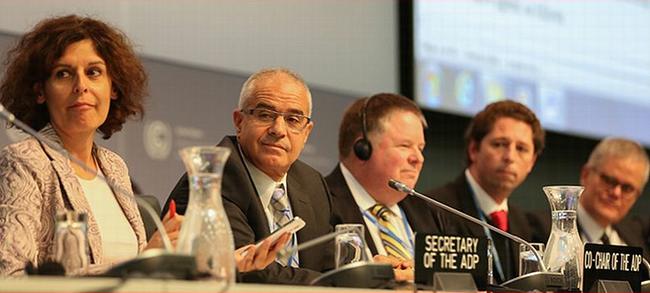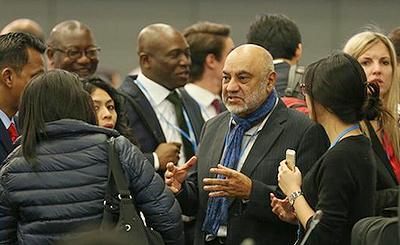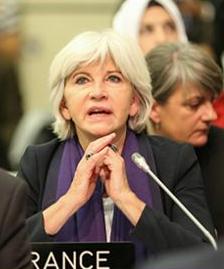Climate Pledges Too Weak to Avert Disaster
BONN, Germany, October 19, 2015 (ENS) – World leaders gathering in Paris in December for the 21st annual UN Climate Conference, COP21, are expected to sign a legally-binding international agreement to limit global warming to no more than 2 degrees Celsius above pre-industrial levels.
Ahead of the conference, organizers have requested that countries submit Intended Nationally Determined Contributions, or INDCs, pledges to reduce greenhouse gas emissions, by an amount that supposed to be “fair and ambitious.”

The Ivanpah Solar Electric Generating System is the world’s largest concentrated solar thermal plant. Located in California’s Mojave Desert, with a gross capacity of 392 MW, it deploys 173,500 heliostats that focus solar energy on boilers on three centralized solar power towers. Utility-scale electricity – zero-emissions. (Photo by Ken Lund)
To date, 150 INDCs have been submitted from all regions of the world, representing a coverage of almost 90 percent of global emissions, much more than in the past.
But Members of the European Parliament last week expressed concern that the early analysis of tabled INDCs would result in the global average temperature rising by between 2.7 degrees and 3.5 degrees Celsius.
They called for the Parties to agree in Paris to revise them before 2020 in order to bring them into line with the latest scientific assessments and a safe 2°C-compatible global carbon budget.
This issue is front and center today as the last formal negotiating session before Paris opened in Bonn.
Here, Luxembourg, on behalf of the European Union and its 28 Member States, congratulated those countries that have submitted INDCs but said the level of these commitments will not keep the planetary temperature low enough to avert climate disaster.
“The Paris Agreement needs to ensure that we do much more, and that action will be continued, as this first sequence of INDCs on the table clearly do not keep temperature rise to well below 2°C global warming,” the EU delegate said.
“It is the Paris agreement that needs to help close that gap, to be able to help us engage the transformation of our development, to put us on a low emission pathway, but also development that is resilient to climate impacts and encourages a transformation of investment, finance, technology development and transfer and facilitates the necessary capacity building of countries,” said the EU delegate.

The Philippine Navy Provincial Disaster Response Task Unit brings relief goods to Bacarra, Ilocos Norte after Typhoon Ineng flooded the area August 22, 2015. (Photo courtesy Philippine Navy)
The delegate from the Maldives spoke on behalf of the Association of Small Island States, which are already experiencing the most devastating effects of climate change.
“In what has become a grim routine for this process, we begin these talks as yet another devastating storm churns over the Philippines. One of our members – the Bahamas – will now be forced to rebuild in the aftermath of Hurricane Joaquin, which battered the islands for three days, washing away scores of homes and flooding countless acres of agricultural land with salt water, caused at least US$60 million in damage,” he said.
“Earlier this year, Cyclone Pam and Typhoon Maysak, left a trail of destruction across Vanuatu, Solomon Islands, Tuvalu, Kiribati, and Micronesia with record-breaking tropical storms.”
“Meanwhile, and for only the third time in recorded history, an extensive coral bleaching event that spans our membership – from the Pacific to the Caribbean to Africa and the Indian Ocean – is now underway and could result in the loss up to 5% of the world’s reefs this year alone.”
“Powerful storms, more frequent and intense flooding and droughts, the loss of ocean habitats that form the foundation of our marine-based tourism industries, and other climate impacts are eroding the fabric of our economies and societies,” he said.
“Co-Chairs, The principles and provisions of the Convention are the bedrock of our work and must be honored if we are to reach agreement on issues that have life and death consequences for our members,” the Maldives delegate said.
A study by 18 non-governmental organizations released Monday found that all major developed countries have failed to take on their “fair share” in planned efforts to tackle climate change.
Taking into account developed countries’ historical responsibility and their capability, “the ambition of all major developed countries fall well short of their fair shares, which include not only domestic action but also international finance,” said the NGOs in their report.

Leaders at the Bonn Climate Talks: from left: Marcela Main Sancha, ADP Secretary; ADP Co-Chairs Ahmed Djoghlaf, Algeria, and Dan Reifsnyder, US; and Andrew Higham and Halldór Thorgeirsson, UNFCCC Secretariat [ADP stands for the Ad Hoc Working Group on the Durban Platfrom for Enhanced Action] (Photo courtesy Earth Negotiations Bulletin)
“We are concerned with the inadequacy of developed countries’ current commitments on emission reductions and provision of financial and technological support,” said the China delegate, speaking on behalf of Brazil, South Africa, India and China, the BASIC group, and echoing the statement of the Group of 77 developing countries and China.
“We believe that ambition and effectiveness will be achieved by maintaining differentiation among developed and developing country Parties in each element of the agreement. This will enhance participation and efforts by all countries,” said the China delegate.
Laurence Tubiana, France’s Climate Ambassador, urged the Parties to “negotiate, in good faith, with respect for each others’ positions” and to “produce a clear, concise, comprehensive, balanced and ambitious text” by the end of the week.
Now a new study by researchers at the Massachusetts Institute of Technology, MIT, and the Center for International Climate and Environmental Research in Oslo, Norway, has found that pledges by the three largest emitters – China, the United States and the European Union – leave little room for the rest of the world to emit.
Based on the pledges submitted, the United States plans to reduce emissions by 28 percent by 2025, and 83 percent by 2050.
The EU will work toward reductions of 40 percent by 2030, and 80 percent by 2050.
China has not pledged a numerical reduction, but has indicated that its emissions will peak by 2030; China also aims to improve its energy efficiency by 60 to 65 percent.
Taking these commitments into account, the researchers found that the other nations would be forced to adopt per capita emissions seven to 14 times lower than the three top emitters by 2030, in order to keep global temperatures from rising above 2 degrees Celsius.

Delegates discuss issues informally with Gurdial Singh, Malaysia, in blue scarf, who spoke on behalf of the Like-Minded Developing Countries (Photo courtesy Earth Negotiations Bulletin)
“The challenge of this problem is, we have about seven billion people on the planet, and about one billion of us live pretty well,” said Susan Solomon, a professor of atmospheric chemistry and climate science at MIT.
“The other six billion are struggling to develop, and if they develop using carbon as we did, the planet is going to get quite hot,” she said. “And hot is, of course, just the beginning of the story in terms of what climate change actually means.”
Published in the journal “Environmental Research Letters,” the paper by Solomon and her colleagues concludes that even if the three largest emitters fulfill their pledges, they would “lock the world into a higher long-term temperature increase” of around 3 degrees Celsius.”
“People don’t realize that 2 degrees Celsius is a big change,” Solomon says. She cites the summer of 2003, when an unprecedented heat wave killed more than 10,000 people throughout Europe.
“That summer was about 2 degrees Celsius hotter than an average European summer,” Solomon says. “By 2050, every summer in Europe will probably be 2 degrees hotter than average, if we keep going the way we’re going right now. Three degrees, in my opinion, is a really frightening change.”
Solomon says countries must ramp up efforts to decarbonize. In the short term, she says, international climate talks must integrate discussions on research and development, to spur technological innovation.
“We have to decarbonize the energy system via research and development, changes in technologies and policies, and we need to encourage those to happen,” Solomon says. “We’ll get the environment we ask for.”
Copyright Environment News Service (ENS) 2015. All rights reserved.
http://ens-newswire.com/2015/10/19/climate-pledges-too-weak-to-avert-disaster/
